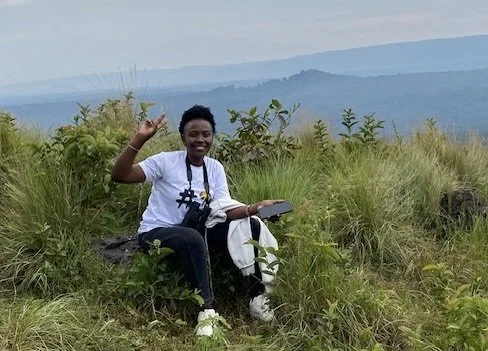Christine Robby, our first Masters graduate
Christine Robby, on a hike in the Kakamega National Forest, described as the only tropical rainforest in Kenya.
Conflicts between wildlife and humans – and the humans’ domestic animals and crops – are increasing in much of the world. It’s very much the case in densely-populated western Kenya, where wildlife is being squeezed out of its natural habitat as forest land is being cleared for agricultural use.
CES graduate Christine Robai Injendi (Christine Robby) is helping solve the growing problem of human-wildlife conflicts, with a particular focus on birds and their tendency to eat crops such as rice or maize. For a farmer counting on those crops to provide income and food for her family, this is no small problem.
It’s a problem which Christine is helping to solve.
Christine and CES: a long journey together
The journey to that point hasn’t been easy for Christine, coming from a difficult family background. CES stepped in to help when Christine was in Form Two (Grade 10). We supported her through the rest of her time at Friends Girls High School Kimang’eti, a boarding school.
Christine achieved marks high enough to enter the University of Embu, where she studied Environmental Conservation and Natural Resource Management Upkeep, with support from CES. That completed, CES supported Christine through her Masters in the Biology of Conservation program.
This included a sponsored project at the University of Uppsala in Sweden, where she participated in a project on preventing crop damage by geese. Christine studied various means of “scaring” birds so they will find other sources of food. These include traditional scarecrows, kites, and inflatable human figures. Christine put her findings into her thesis, which she successfully defended in August 2025, with graduation in September.
Christine has also worked as a research assistant on several bird scaring projects in Mwea, Kenya, where she studied avian behavior and developed practical, sustainable solutions to reduce crop damage while conserving local bird populations. She has also conducted and published research on reducing crop damage by geese, evaluating the effectiveness of different scaring techniques to promote coexistence between agriculture and wildlife conservation.
While completing her Masters, Christine started her own business, Robby’s Nature & Education Tours, which has carried out several successful tours including a hike on Mount Kenya, the highest peak in the country.
You can learn more about Christine’s journey, and how CES has supported her, in this video.

